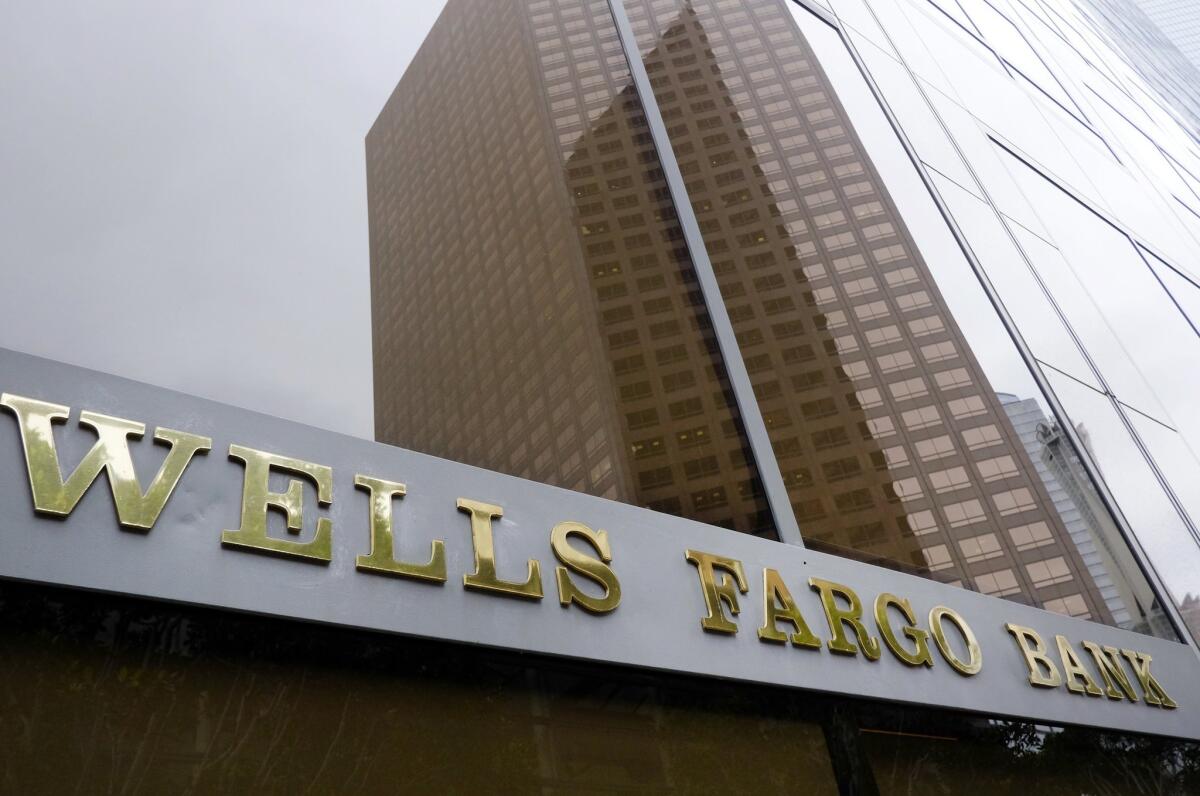Wells Fargo’s sales tactics are reportedly under investigation by the U.S.

Aggressive sales tactics at Wells Fargo Bank, already the subject of a lawsuit filed by L.A.’s city attorney, appear to have drawn the attention of federal regulators.
The Office of the Comptroller of the Currency and the San Francisco Federal Reserve are probing the bank’s practices, the Wall Street Journal reported Monday, citing unnamed sources. An attorney representing Wells Fargo customers and former employees who have sued the bank told The Times that representatives from the OCC, a federal bank watchdog, have contacted his office about those cases.
The inquiries, like a lawsuit filed this year by the Los Angeles city attorney’s office, appear related to allegations that the San Francisco banking giant has employed a high-pressure sales system that encourages illegal behavior by employees.
SIGN UP for the free California Inc. business newsletter >>
The bank’s practices came to light in a 2013 Times investigation that found Wells Fargo employees, facing strict sales quotas and fearing retribution from their superiors, created accounts without customers’ knowledge and even forged customers’ signatures.
Representatives at the OCC and the San Francisco Fed would not confirm they are investigating the bank’s practices. A Wells Fargo spokeswoman also declined to comment.
If the agencies are probing the bank’s practices, it would mark an escalation of what has so far been a local matter -- one the bank has argued is the jurisdiction of federal regulators.
Los Angeles City Atty. Mike Feuer in May filed a civil suit against Wells Fargo, alleging bank employees opened unauthorized accounts and used other illegal tactics to meet rigid and unrealistic sales goals.
Wells Fargo prides itself on getting its customers to use numerous bank services, such as checking accounts, savings accounts and credit cards. Unlike most lenders, it reports in annual filings the average number of banking products used by the average customer.
But bank officials balk at the notion that Wells Fargo’s focus on so-called cross-selling has led to widespread fraud and say the bank’s policies do not encourage illegal behavior.
“We disagree with the allegations in the L.A. City Attorney’s lawsuit and intend to defend ourselves,” bank spokeswoman Mary Eshet said Monday. “Wells Fargo’s culture is focused on the best interests of its customers.”
The bank has also argued that Feuer does not have the jurisdiction to take the bank to court. In a June filing responding to the city’s suit, the bank’s attorneys said various federal laws put the bank beyond the reach of local officials and that the OCC and other federal agencies are responsible for regulating national banks.
Bert Ely, a banking consultant in Alexandria, Va., said such matters are typically left to federal, not local, authorities.
“There’s a basic jurisdictional issue here,” Ely said. “I would question to what extent the city attorney or even the state attorney general could get into this, given that Wells is a national bank.”
He suggested that Feuer’s suit could have been aimed at drawing the attention of federal regulators -- something it now seems to have accomplished.
Ely also speculated that if the OCC and the San Francisco Fed are looking into Wells Fargo over consumer complaints, the federal Consumer Financial Protection Bureau, an agency created in the wake of the financial crisis by the Dodd-Frank Wall Street Reform Act, could be involved, too.
“They would be a key contender,” he said.
A bureau spokesman declined to comment.
Twitter: @jrkoren
ALSO
The IMF’s decision on the yuan is a victory for China -- and a challenge
Why rooftop solar advocates are upset about California’s clean-energy law
Mark Zuckerberg and Priscilla Chan pledge to donate 99% of their Facebook shares
More to Read
Inside the business of entertainment
The Wide Shot brings you news, analysis and insights on everything from streaming wars to production — and what it all means for the future.
You may occasionally receive promotional content from the Los Angeles Times.











